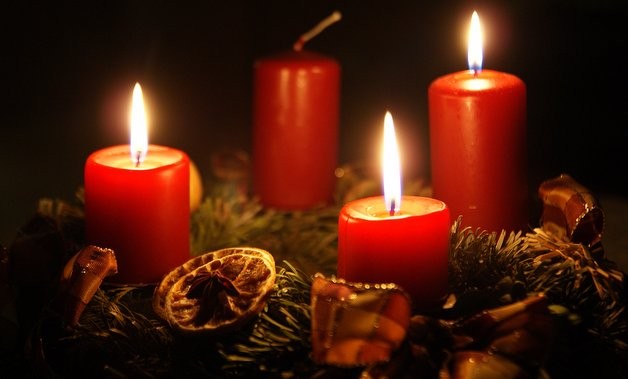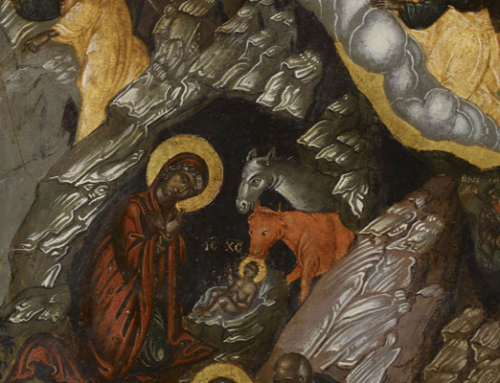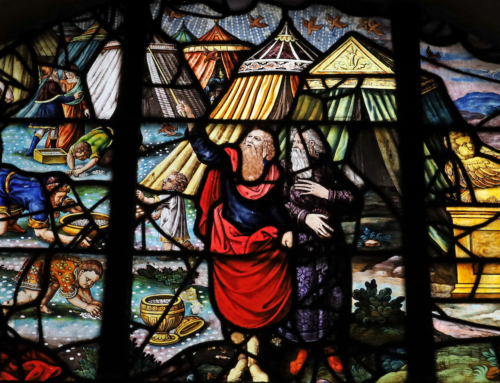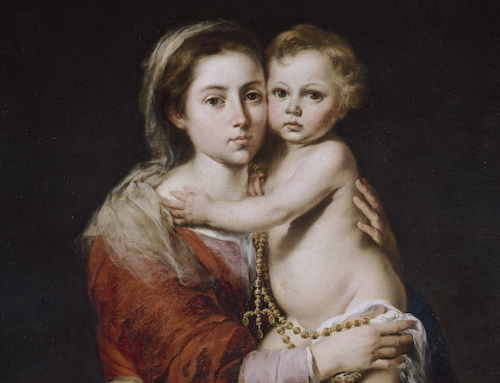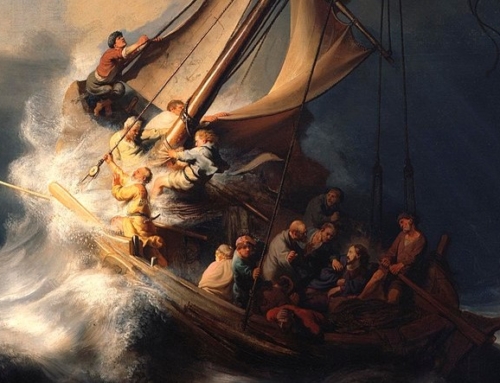An unexpected guest never shows up when you’re prepared. Never does a sudden knock at the door or text message reading “stopping by ok?” arrive right after you’ve cleaned the place and everything just happens to be in perfect order.
Christmas is one week away. And this post is for the panicked. For those feeling spiritually unprepared, in particular.
Even though Christmas comes with plenty of warning—even though we might have resolved to be intentional about preparing a way for the Lord when we saw the first Advent candle lit at Mass several Sundays ago—December can drag us in all sorts of directions, and Christmas ends up feeling like the most unexpected of visitors.
“Ohpleasecomein,” you hear yourself saying stiffly to the unanticipated guest in the doorway, as your jaw muscles clench and you pivot out of the way so he or she will come through. It can be deeply unsettling to enter your own house following after a visitor. I tended to peer anxiously over their shoulder as my mind raced: Is that pile of clean laundry still sprawled on the couch? Why didn’t I do all those dishes this morning when I had the chance? Oh no, the bathroom…
The presence of an unexpected guest makes you see your abode differently. You wonder what judgments they might (justifiably) be making. Even after you conduct the usual business of apologizing for the mess and they reply with the customary nonchalance (“oh, don’t worry about it”), you can’t help but wonder what the place looks like to them. And what it says in turn about you. Not what you like to tell yourself about yourself, but what it really says about the reality you live in. Because it can become all too easy to live with our own messes and get used to ignoring the clutter we create. It requires the introduction of another to prompt real self-evaluation. (Hence we confess our sins to a priest, who stands in the person of Christ, in the sacrament of Reconciliation. Doing so helps us see ourselves as we really are.)
I’ve been the surprise house guest often enough to observe trends in my hosts’ responses: some hold tight to the embarrassment of having been found unprepared, and they remain distracted throughout the visit. They’ve opened one door, but kept a more important one shut. Others are able to let it go, because they simply care more about the person in their midst than the mess.
To feel spiritually unprepared for Christmas is to acknowledge, in a sense, that we are not ready to welcome Him under our roof. In this way, there is some connection between the Christmas panic and Communion panic. I am referring to the experience of those of us who, although we satisfy the requirements for reception of Holy Communion, still feel somehow unprepared spiritually to welcome Christ in Communion. We may be unfocused: burdened by mental distraction or spiritual aridity. Or too focused—dwelling on our compunction, stemming from the genuine recognition that our past (though now forgiven) sins indeed left our souls less hospitable dwellings than He deserves. Capturing the feeling of the latter, the Catholic novelist Léon Bloy writes in a private reflection:
I am going to Communion. The priest has uttered the fearful words which a fleshly piety calls consoling: DOMINE NON SUM DIGNUS [‘Lord, I am not worthy’]… Jesus is about to come, and I have only a moment in which to prepare myself to receive Him… I do not recall having swept clean this dwelling wherein He will enter as a king or as a thief… I give it a glance, a poor glance of terror, and I see it full of dust and full of filth.
In response, however, we must remember what type of Guest we’re about to receive. For, as Bloy concludes, “Ah! truly it takes God not to fear entering such a house!” And fear He does not.
When Christ comes to share His life with us—liturgically at Christmas, and sacramentally in the Eucharist every day—He does not expect to find things in perfect order already, as if we were capable of cleaning up the mess on our own. That’s the very point of His coming to us in the first place. He does not say to us, “Behold, I stand at the door and knock; and if anyone hears my voice and opens the door you better have everything spotless first, mister.” Rather, He vows, “if anyone hears my voice and opens the door, I will come in to him and eat with him, and he with me” (Rev 3:20). He doesn’t even specify you should have a meal prepared. He simply invites you to open the door. He’s all too pleased to help with the rest. In Reconciliation, it’s the help of His forgiveness. In the Eucharist, it’s being nourished with He who alone can satisfy the deepest human longings. I’m not worthy to receive You, Lord, and that’s exactly why You want to be received. It’s a reassuring meditation when you’re steps away in the Communion line. At Christmas or on any day.
Our model and patron for hospitality under surprising circumstances is St. Joseph. No expectant groom has ever met with such unexpected guests on his doorstep. But he is swift in welcoming Mary and the unborn Savior into his home (cf. Mt 1:24). Not because he has been looking for or planning on this, but because, this reality having appeared, he cannot wish for any other. Let us be realistic about these final days of Advent, and we will be met by graces unlooked-for and unmerited, but not unwelcomed.
✠
Image: Liesel, Advent Wreath with Burning Candles

